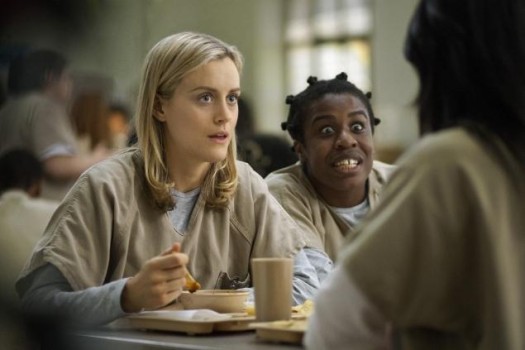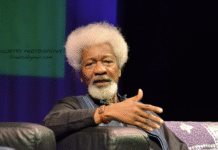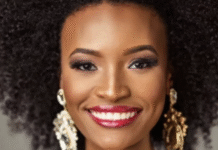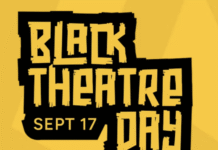
The blogosphere is still reeling over Dancing with the Stars dancer Julianne Hough’s poor taste in Halloween attire this year. In case you’ve been hiding under a rock, Hough is under fire for darkening her skin to appear as the character ‘Crazy Eyes’ played by Uzo Aduba on the hit Netflix show Orange is the New Black (OITNB). Hough, who has apologized for the lapse in judgment, has been called everything but a child of God for daring to darken her skin to take on the appearance of this character.
Why people are gasping and swooning over the latest inappropriate Halloween costume that goes too far in the world of make believe is a mystery to me. Each year, like clockwork, folks trot out their grand ideas for Halloween costumes, many of which are racist and sexist in nature, and there is some type of controversy. Just like you can count on tax season each year, you can count on offensive Halloween costumes that court controversy and have folks up in arms.
What I’m up in arms over is that people are enraged by Hough’s racist costume but have been radio silent when it comes to the character of ‘Crazy Eyes’ on the hit show. In case you don’t watch the show, ‘Crazy Eyes’ is a mentally ill black lesbian inmate who is obsessed with the main character of the show, Piper, played by Taylor Schilling. Piper just happens to be a yuppie white woman. Early in the season, “Crazy Eyes,” who wears her hair in Bantu knots, slinks around the prison, “taking care of” Piper, who just happens to be in prison, based on her association/”relationship” with — wait for it– a criminal lesbian, which is just as problematic as the race issue. Before you start the “but wait” mail, the inclusion of a black Transgender character played by a black Transgender woman is fantastic, but does not excuse the problematic representations of lesbians on this show. But that’s another post.
What is ironic about the situation is the same way in which ‘Crazy Eyes’ is obsessed with Piper, is reflected in the way that some in the media are obsessed with Hough’s behavior, while overlooking the real problem staring them right in the face with bulging eyes. What problem is that? The physical and behavioral characteristics of ‘Crazy Eyes.’
Why are we mad at Hough for dressing up as ‘Crazy Eyes’ when ‘Farina’ is making a comeback in a Netflix series? No, I’m not talking about the cereal Farina. I’m talking about the character of ‘Farina’ of The Little Rascals fame, a character fashioned after the “pickaninny” stereotype – a usually disheveled child with bulging eyes, protruding lips, and “primitive” in behavior. The only thing missing from the character of ‘Crazy Eyes’ is muslin.
http://youtu.be/iev8kRsnNwU
Overlooking a character that is patterned after a “pickaninny” that littered the early days of radio, television, magazines and even postcards is pretty maddening. Kohan’s writing of and Aduba’s animalistic portrayal of the character of ‘Crazy Eyes’ (cue ‘Crazy Eyes’ popping a squat outside of Piper’s cell and pissing in the middle of the floor when angry) is perhaps the most stereotypical representation of blackness to hit the small screen in recent memory. Why aren’t we mad about that? Oh, because it’s not Halloween.
Each Halloween, some moron paints his face black and posts it online (cue the racist and thoughtless Trayvon Martin Halloween costume photos) and each year people get indignant over the poor lapse of judgment exercised by people who should know better, but choose to do the wrong thing anyway. We save our ire for controversial Halloween costumes while simultaneously overlooking the onslaught of problematic images of blacks in general and black women in particular in a range of television genres (reality television, anyone?). Instead of starting with the cause of the problem (the fact that this character exists in the first damned place), we focus on the symptom (some idiot darkening her face for Halloween, again).
Instead of questioning Julianne Hough’s motives for darkening her face to play ‘Crazy Eyes’, perhaps we should be asking ourselves why we are active about Hough’s misstep but passive when it comes to the actual portrayal of the character on OITNB? The physical, emotional and behavioral qualities of ‘Crazy Eyes’ prove that Orange isn’t the new black; in many cases on television and web series, black is the same black – stereotypical, codified, limited and defiled – and there is nothing new about that.
Nsenga K. Burton is founder and editor-in-chief of the award-winning site The Burton Wire. Follow her on Twitter @Ntellectual.
Like The Burton Wire on Facebook. Follow us on Twitter @TheBurtonWire.









Thank You.
I had multiple complaints about the “crazy eyes” character, among other thing s associated with OITNB, and Weeds for that matter. Many of us just shake our heads, because we can’t deal with TV when we are dealing with our workspace, and other closer-to-home racism and sexism.
Thank you!
A: Because it is simpler and easier to deal with blacklisting an actress who likes dressing in blackface than it is to eliminate all racial stereotypes from the entire television industry.
PS: Your argument is tantamount to saying there should be no pushishment for hate crimes until we, as a society, get rid of the hateful prejudices that give rise to hate crimes. Until all hate is eliminated from the world, we should not punish individual offenders. Brilliant article.
I don’t have a problem with the characters because they are supposed to be based on real life people from the author’s real time in prison. If they were made up it would be a problem but not even necessarily then because the other black characters are well balanced, all of the women are.
[…] guest actress in comedy during Saturday’s Creative Arts Emmys. Aduba plays the role of “Crazy Eyes” on the hit Netflix series that takes place in a women’s correctional […]
Comments are closed.